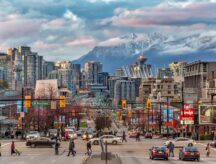How immigrants can learn more about Indigenous people in Canada
June 21 is National Indigenous Peoples Day, an occasion to celebrate Indigenous people and cultures in Canada. Although immigrants oftentimes come to Canada not knowing much about Indigenous people, a recent Environics Institute survey suggests that immigrants generally want to support them, and one of the ways to do so is through learning.
Since white European settlers colonized the land we now know as North America, negative narratives of Indigenous peoples have been spread in the media, leading to harmful stereotypes. Canadians and immigrants alike may be influenced by these narratives.
Canada is now in a period of seeking reconciliation for its violent crimes against Indigenous people. The Canadian government's attempts to erase Indigenous culture led to the creation of the Truth and Reconciliation Commission, which put forth recommendations on how Canada can reconcile with Indigenous people.
The Environics Institute survey suggests that, despite their lack of exposure to Indigenous people, immigrants are mostly supportive of reconciliation.
"This is reassuring in terms of the process of reconciliation—the presence of so many immigrants in Canadian society is not in and of itself an impediment to making progress on reconciliation," the survey results say. "When newcomers arrive here, they engage with Canadian issues and feel some responsibility for helping to move things forward."
However, the knowledge gap suggests that newcomers to Canada are still lacking information about Indigenous people. In this article, we go over a brief history of European colonization in Canada, and offer resources for further learning.
Learn more about Canadian immigration
The differences between terms
When we talk about Indigenous people in Canada, we're referring to the collective name for the original peoples of North America. There are more than 1.6 million people who identify as Indigenous in Canada alone. Therefore, it is important to remember that being Indigenous is not a singular experience, but a collection of many experiences unique to each nation, group, community, family and individual.
The Canadian government recognizes three broad groups of Indigenous people: First Nations, Inuit, and Métis. Each group represents a diversity of cultures, histories, and ethnicities. First Nations refer to the people who belong to more than 630 communities across the country, representing more than 50 nations and languages. Inuit refers to the collective cultures of the people of the Arctic. Métis refers to the diverse cultures of people who were descended from European and Indigenous unions.
The term "Indian" when used to describe Indigenous people is said to come from Christopher Columbus, a European explorer who wrongly thought he had reached India in 1492. It is still used in Canadian law to this day, although it is considered offensive, especially when non-Indigenous people use it to describe Indigenous people.
A brief history of colonization in Canada
Before North America was "North America", many Indigenous groups called it Turtle Island. Indigenous people had their own systems of government, laws, and traditions. They had different philosophies pertaining to the use of resources and land stewardship, which clashed with the European settler's vision for Canada.
After Canada officially became a country in 1867, the Indian Act was formed. This legislation, which is still in effect today, has been called a human rights abuse by international organizations such as Amnesty International, the United Nations, and the Canadian Human Rights Commission.
Under the Indian Act, the Canadian government created legislation that served to erase Indigenous culture. It allowed Canada to impose a different form of government on First Nations called "bands" and the Canadian government defines who can be a band member. Today, many bands now have an elected council and elected chief, though traditionally some First Nation leadership was passed down through the family. Hereditary leadership still exists, and some bands have both hereditary and elected leaders. Some First Nations also have self-government agreements, which allow them to make laws, build economic opportunities, and raise money through taxation to deliver programs.
The Indian Act also called for every Indigenous child to attend a residential school and made it illegal for them to attend any other educational institution. As such, Indigenous children were stolen from their parents and faced horrific abuse. The last residential school closed in 1996, however, the damage and trauma caused by these institutions still affect Indigenous people to this day. In 2021, the remains of 215 children were found near a former residential school in Kamloops, B.C. The findings sparked a national discussion on reconciliation in Canada.
Indigenous people are still fighting colonization, racism, and cultural appropriation to this day. Although the government has invested interest in truth and reconciliation, the fact is people are still suffering under the current laws that continue to oppress Indigenous people.
Despite the ongoing struggle, Indigenous people are restoring their cultures, languages, and raising children to be proud of their identities. There are many Indigenous-led festivals and events that welcome non-Indigenous people to participate, as well as cultural and knowledge-sharing initiatives.
Resources for immigrants wanting to learn more about Indigenous people in Canada
Indigenous art, music, and learning resources are available online for all to access from anywhere. This is not an exhaustive list, but it will give you somewhere to start.
APTN is a cable network that offers Indigenous-led TV shows, news, and movies for kids and adults. You can also stream their programs online.
If you are already in Canada, your community may have a Friendship Centre that provides culturally appropriate services to Indigenous people, and hosts events that connect Indigenous and non-Indigenous folks.
Powwows are cultural events where you'll get to experience Indigenous music, dance, regalia, food, and crafts. Keep in mind etiquette at powwow and you will be sure to have an unforgettable experience.
General information
Indigenous Peoples Atlas of Canada
This interactive magazine offers stories and articles about Indigenous people in Canada.
A free online course from the University of Alberta presented in a video series. It provides you a comprehensive guide to Indigenous culture, people, and history.
Crown-Indigenous Relations and Northern Affairs Canada
A Canadian government website for one of the government departments responsible for policies relating to Indigenous people.
More information about the Indian Act, its history and its controversy by the University of British Columbia.
Studies on Indigenous and immigrant relations
Indigenous Perspectives of Immigration Policy in a Settler Country
A 2022 paper that explores Indigenous perspectives on immigration, explains Indigenous vs Western concepts of land ownership, and open border vs no border philosophy.
A 2012 masters thesis by Melissa May Ling Chung, who incorporates her experience as an Indigenous-Asian woman growing up in Canada into a discussion on immigrant and Indigenous relations.
Vancouver Dialogues: First Nations, Urban Aboriginal and Immigrant Communities
A 2011 project where immigrants and Indigenous participants shared stories, experiences, and perspectives with each other.
Learn more about Canadian immigration
© CIC News All Rights Reserved. Discover your Canadian immigration options at CanadaVisa.com.
- Do you need Canadian immigration assistance? Contact the Contact Cohen Immigration Law firm by completing our form
- Send us your feedback or your non-legal assistance questions by emailing us at media@canadavisa.com







